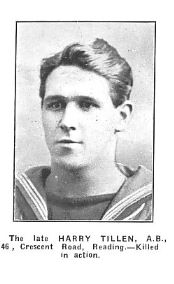Harry Tillen
Able Seaman Royal Navy H.M.S. “Invincible”
 |
Harry Tillen was the son of Kate Allen (formerly Tillen) of 46, Crescent Road. (CWGC register gives spelling as Tillin) The 1901 census indicates that Kate had married George Stephen Allen, a gasman’s labourer and they lived at 57 Foxhill Road, Reading. Harry was the youngest of Kate’s three children who are recorded as George’s step children. The 1911 census indicates that the family hadmoved to Crescent Road and Harry was working as a grocers errand boy.
Harry Tillen was lost at sea and his name is commemorated on the Portsmouth Naval Memorial. His name is commemorated on the Alfred Sutton School Memorial and also commemorated on the Park Church and Institute Memorial. Harry Tillen was aged 20 years when he died.
The H.M.S. “Invincible” was among the Battle Cruisers of the Grand Fleet which was reviewed by the King in July 1914. The Britain Empire ruled the seas and was superior to any other Empire in the number of vessels at its disposal. Harry Tillen would have been proud to serve as an able seaman in this navy.
In 1916 with a stalemate on land it became the turn of the navies to try and break the deadlock at sea. The British Grand Fleet was based in the Firth of Forth, Moray Firth and Scapa Flow; the German High Seas Fleet at Wilhelmshaven. On the morning of 31st May 1916 Mary Clarke, a young nursing sister on board the Grand Fleet Hospital Ship Plassy, watched the cruisers steaming up and with the other nurses “wondered if there is really anything doing this time, there have been so many false alarms.” She recorded in her diary that “this evening after dinner two or three officers arrived in board with note books etc to find out what accommodation we had got for the wounded, how many cots, how many stretchers etc & later on we got a signal to get full steam going, so as to sail at a moments notice.” The battle cruisers she had watched in the morning had been setting out for Jutland, a Danish territory, by evening two of them had already been sunk by the German navy. The “anything doing” turned out to be Battle of Jutland, the only major sea battle of the Great War.